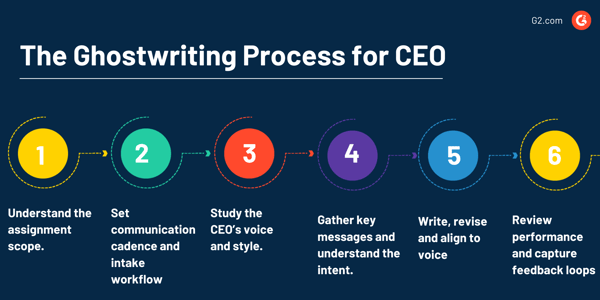If you've ever read a compelling article or book by a public figure and thought, “This is brilliantly written,” chances are a ghostwriter helped bring that voice to life. Public figures like CEOs or entrepreneurs often resort to ghostwriting to fine-tune and polish their words. But, as most high-profile individuals rarely have time to craft long-form content, they often enlist ghostwriters to voice their stories with clarity and consistency.
Brands that want to hire ghostwriters use content writing services software to shortlist candidates, enlist content briefs, hire freelancers, and outsource projects.
So how can ghostwriting shape your professional journey, and what steps should you take if you want to pursue it as a serious career? Let's find out.
What is ghostwriting?
Ghostwriting is when a professional writer creates content credited to someone else. The client provides ideas or direction, and the ghostwriter produces books, blogs, or speeches. They’re paid for their craft but stay invisible, allowing clients to publish refined content that reflects their ideas, without having to write every word themselves.
In business, ghostwriting helps busy leaders articulate their ideas clearly and consistently without sacrificing valuable time. Whether it’s a blog post, keynote speech, or LinkedIn update, ghostwriting allows a CEO’s message to be heard, even if they didn’t type the words themselves.
As a person of power, your CEO has a lot of valuable information with little time to write a book. Ghostwriting can be highly lucrative too. A Publishers Weekly survey found that one-third of ghostwriters earn over $100,000 annually, often from high-stakes book deals or executive content collaborations.
Further, the same survey reported that 8% of ghostwriters charged more than $150,000 for their last nonfiction manuscript, 2% have written 10 or more New York Times bestsellers, and 1% indicated a fee of over $300,000.
TLDR: Everything you should know about ghostwriting
- What it is: Ghostwriting is the process of writing content, like books, blog posts, articles, or speeches, that is officially credited to someone else rather than the writer.
- Why do businesses hire a ghostwriter? It allows busy executives, thought leaders, and public figures to share ideas and build influence without personally drafting every piece of content.
- Where is ghostwriting used? Ghostwriting is common in business communications, nonfiction publishing, social media posts, keynote speeches, op-eds, and executive memos.
- What skills does a ghostwriter need? Success in ghostwriting requires voice adaptability, sharp research skills, emotional intelligence, confidentiality, and the confidence to write with limited input.
- Is ghostwriting ethical? Ghostwriting is ethical when both parties agree to the arrangement and fair compensation is provided; many experienced ghostwriters earn six figures annually.
- How to start a ghostwriting career: With high demand and low visibility, ghostwriting can be a profitable niche for writers who thrive behind the scenes and want to work closely with high-profile clients.
Ghostwriting vs. credited writing: what's the difference?
Understanding how these two terms differ will help you decide which path aligns best with your goals, whether you're building influence, or helping others build theirs.
| Aspect |
Ghostwriting |
Credited Writing |
| Authorship |
Written by you, but credited to someone else |
Written by you, and your name appears as the author |
| Voice and style |
Must replicate the voice, tone, and perspective of the client or subject |
Uses your own voice, tone, and narrative style |
| Creative control |
Limited, your job is to reflect the client’s ideas and preferences |
High, you own the message, structure, and creative direction |
| Recognition |
Behind the scenes, no public credit or byline |
Public visibility helps build your personal brand |
| Purpose |
To elevate someone else's thought leadership or communication |
To express your own expertise, opinion, or storytelling |
| Collaboration level |
High, often involves input from the client or their team |
Low to moderate, more independent writing process |
| Ideal for |
Freelancers, communications pros, or content strategists writing for executives |
Journalists, content marketers, and creators building their personal platform |
Whether you're helping a CEO articulate their vision or publishing your own bylined blog, both forms of writing serve powerful but different purposes. Choose ghostwriting if you want to amplify others’ voices; choose credited writing if you're ready to build your own.
Equip yourself with the right tools to ghostwrite with confidence
Whether you’re ghostwriting for a blog, book, or executive piece, you need writing and editing tools that support accuracy and collaboration. G2 features real reviews on grammar checkers, content platforms, and editing software to help you choose what fits your workflow best.
Compare the best content creation solutions on G2 now.
How to become a professional ghostwriter in 5 steps
Breaking into the world of ghostwriting, especially in executive communications or B2B thought leadership, requires more than just strong writing chops. It takes a unique mix of voice agility, emotional intelligence, strategic thinking, and the ability to build trust from behind the scenes.
If you're wondering how to become a ghostwriter who works with CEOs, founders, and subject matter experts, here’s a step-by-step roadmap to help you get there.
- Master foundational writing skills: Ghostwriting starts with clean, persuasive writing, not flashy prose. You need to write in someone else’s voice with clarity and control, mastering sentence flow, tone, grammar, and narrative structure. The best ghostwriters can shift effortlessly between formats like blogs, LinkedIn posts, speeches, and whitepapers, while grounding the content in the context of business goals and audience needs.
- Build a diverse, voice-flexible writing portfolio: A professional ghostwriter’s portfolio should highlight not just skill, but range. Include anonymized samples of leadership emails, long-form blogs, op-eds, internal memos, and social content. Even if you're not credited, describe the voice you mimicked and the outcomes your writing supported. If you’ve worked in-house, seek permission to repurpose past projects into portfolio pieces that show how you write for impact, without needing a byline.
- Practice voice matching and editorial empathy: One of the most essential ghostwriting skills is the ability to mirror someone else's communication style. That means studying how your subject thinks, speaks, and writes — right down to sentence rhythm, use of metaphor, and tone of authority. Pay attention to their natural word choices, pauses, and messaging patterns. Then channel that into your drafts. Editorial empathy means representing their voice so well, it feels like they wrote it themselves.
- Start small and grow through referrals: If you’re just starting out, offer ghostwriting help to founders, consultants, or peers who need to communicate but don’t have time to write. Begin with short-form content like leadership LinkedIn posts, pitch decks, or internal messages. If your work clicks, it often leads to bigger projects like blogs, speeches, or articles under their name. Ghostwriting is a trust-based business, and your best marketing is delivering great work that makes clients sound like their best selves.
- Network with gatekeepers and decision-makers: Ghostwriting gigs often come through the people who support executives: think PR agencies, communications teams, marketing leads, or even executive assistants. These stakeholders manage editorial workflows and vendor relationships, and they're often the first to realize a leader needs ghostwriting support. Reach out to them with tailored samples and a clear pitch.
It is not just about the theoretical efforts you put into creating your ghostwriting portfolio or setting up networking initiatives to earn projects, but also how well can you manage multiple projects within deadlines and no compromise on quality.
The ghostwriting process for executive content
If you’re wondering what is ghostwriting like for CEOs, know this: it’s not just about putting words on a page. It’s about understanding a leader’s vision, voice, and audience, and then translating all of that into impactful content that sounds like it came straight from them.
Whether you’re new to executive ghostwriting or looking to refine your approach, here’s a detailed breakdown of the complete ghostwriting process tailored to leadership communications.

1. Understand the assignment scope
Every successful ghostwriting engagement begins with clear expectations. Before diving into drafting, it's vital to understand the scope of the project and the strategic goals behind it.
Ask yourself (and the CEO, or their delegate): What type of content is being requested? Is it a thought leadership article, an internal announcement, a product launch memo, or a LinkedIn post? Who is the target audience, employees, partners, the board, or the public? Most importantly, what is the intent behind the communication — is it to inform, inspire, explain, persuade, or respond to a timely event?
Understanding these elements early on will not only prevent missteps but also ensure your writing aligns with business objectives. For example, a CEO blog post aimed at establishing thought leadership in the industry will sound and feel very different from a quarterly town hall script meant to energize internal teams.
When this alignment is in place, your writing becomes a strategic asset, not just a polished piece of content.
2. Set communication cadence and intake workflow
Once you understand the assignment scope, your next step is to develop a deep familiarity with your CEO’s voice, preferences, and communication style, because capturing their perspective authentically is the cornerstone of ghostwriting.
In a way, a ghostwriter is creating an illusion that the person getting credit for the content is also the writer. To create that illusion, you must understand the way that person communicates and be able to replicate it. The demanding schedule of CEOs makes this difficult. They might have time to meet with you, but that is highly unlikely.
Use your research and observation skills. Look at social media posts, blogs, company emails, and other content written by the CEO, or at least on their behalf.
Even if the chances they wrote it themselves are slim, you can assume they were pleased with the end result because it was released. Pay special attention to written communication tools like word choice, tone, and format. You will be expected to mirror it in your writing.
This consistency helps you maintain content momentum and ensures nothing gets lost in email threads. By institutionalizing this intake process, you create a rhythm that builds mutual trust and reduces ambiguity.
3. Study the CEO's voice and style
Perhaps the most defining part of the ghostwriting process is voice mirroring. Ghostwriting for CEOs demands a deep familiarity with their unique tone, cadence, and communication habits.
This isn't just about using the same words they might use; it’s about capturing their worldview, emotional range, and rhetorical style. To do this well, conduct a thorough review of any previous content they’ve published or endorsed. That might include LinkedIn posts, internal emails, earnings call transcripts, interviews, or even off-the-cuff remarks during all-hands meetings.
Look for consistent patterns in tone (formal vs. conversational), sentence structure (short and direct vs. long and narrative), and their preferred methods of persuasion (data-driven logic, personal anecdotes, or visionary language).
Observing them in real-time settings, such as live presentations or Q&A sessions, can give you valuable insight into how they naturally express themselves.
4. Gather key messages and understand the intent
With the groundwork laid, it's time to gather and structure the core message. Often, the raw input from a CEO will be fragmented, like in bullet points, voice memos, or a quick Slack message, and it’s your job to translate that into a cohesive narrative.
This step is not about guessing; it’s about clarifying. Ask follow-up questions to ensure you fully understand what they want to communicate. What is the main takeaway? What emotional tone is appropriate? Is the message reactive or proactive? What are the risks of misinterpretation?
Sometimes you’ll need to identify not just what’s being said, but what’s not being said, and fill in those narrative gaps. It also helps to contextualize the message within broader organizational goals or current events. For example, if the CEO may comment on a new AI policy, make sure you understand the company’s public stance, product roadmap, and any potential legal sensitivities.
5. Write, revise, and align to voice
Once you have your narrative in mind and a firm understanding of the type of communicator your CEO is, you can write your speech, draft your newsletter, or complete whichever communicative task they have given you.
As you finish your draft, revisit your words to ensure optimum grammar flair. Using tools for proofreading or plagiarism checkers rules out grammar inconsistencies and improves the flow, originality, transitional consistency and readability of your draft.
When writing the content, make sure to keep the CEO’s intended key messages in mind. More than anything, the purpose of ghostwriting for your CEO is to send messages on their behalf in the most effective way possible. When revising your work again, ensure that it matches the typical tone and word choice of the CEO.
As you can tell, the ghostwriting process is not black and white. The correct method depends on the type of content being delivered, your experience and relationship with the person you are ghostwriting for, and their desired outcome.
6. Review performance and capture feedback loops
Ghostwriting doesn’t end when the document is approved or the blog post goes live. If you want to become a ghostwriter that leaders continue to trust, you need to think beyond the page.
Once the content is published, track how it performs. This could mean looking at employee engagement rates, public reactions, comments on LinkedIn, or internal sentiment shifts. Did the content land? Did it drive conversation or alignment? Was it timely and relevant?
It’s also useful to gather informal feedback from the CEO. Did they feel the tone was right? Were they proud to have their name on it? Did it support their broader goals? Over time, capture these insights in a shared content tracker or feedback log. This kind of post-publication analysis helps you refine future drafts and build a consistent, strategic voice that aligns with leadership and organizational goals.
Must have ghostwriting skills for executives
If you're exploring how to become a ghostwriter, or want to elevate your executive communication capabilities, these are the essential ghostwriting skills to hone.
1. Mastery of writing fundamentals and voice adaptation
At its core, ghostwriting is about crafting high-quality, credible content that represents someone else authentically. That means strong writing fundamentals, grammar, clarity, and structure are non-negotiable. But beyond that, the ability to shift tone and adapt your writing voice is what separates average ghostwriters from great ones.
You might be a witty storyteller by default, but if your CEO prefers a concise, no-frills approach, your job is to leave your own voice at the door. Ghostwriting demands flexibility, not ego. You’re not writing to showcase your style, you’re writing to channel theirs.
If you’re serious about breaking into executive ghostwriting, build a diverse portfolio that demonstrates your ability to write in different voices, formats, and emotional registers. CEOs are unlikely to hand over their voice to someone who hasn’t proven they can be invisible.
2. Research savvy and pattern recognition
In most ghostwriting roles, especially those involving C-suite leaders, you’ll rarely get unlimited access to your subject. So, the ability to gather context from limited input is critical. Research isn't just about Googling facts; it’s about absorbing how your CEO thinks, what topics matter to them, and how they position themselves publicly.
Start by reviewing their past communication: press quotes, social media posts, investor letters, public speeches, and Slack updates. Look for recurring phrases, values, and themes. This not only helps you replicate their tone but also enables you to suggest content ideas that align with their priorities.
A skilled ghostwriter can take a one-line prompt and build a full narrative around it, grounded in prior knowledge and informed intuition. That’s the difference between needing direction and being trusted to lead.
3. Empathy, emotional intelligence, and executive awareness
One of the most underestimated ghostwriting skills is emotional intelligence. When you ghostwrite for CEOs, you’re not just channeling their voice, you’re often carrying their authority, stress, and vision. That means you need the emotional range to write across high-stakes moments: layoffs, acquisitions, culture changes, or even public scrutiny.
Great ghostwriters can sense the emotional undercurrent of a message and calibrate their tone accordingly. Is this a rallying message? A moment of vulnerability? A call to action? Empathy allows you to express human emotion with authenticity, even if the CEO doesn’t spell it out for you.
More importantly, emotional intelligence helps you become a trusted partner. CEOs gravitate toward ghostwriters who “get it”, who understand the nuances of timing, audience perception, and executive pressure.
4. Confidence, initiative, and strategic thinking
Ghostwriting often requires operating in ambiguity. You may receive scattered thoughts, last-minute requests, or vague outlines, and be expected to transform them into clear, compelling communication. That’s why the initiative is one of the most vital ghostwriting skills.
Don’t wait to be told what to do. Propose outlines. Recommend formats. Suggest subject lines. Own the drafting process with quiet confidence. Executives respect collaborators who can take the kernel of an idea and run with it.
If you’re ghostwriting for CEOs, assume your audience includes everyone from board members to employees to journalists. Your ability to shape high-quality, on-brand content under pressure will earn you a seat at the table again and again.
Ghostwriting: frequently asked questions (FAQs)
What is ghostwriting?
Ghostwriting is when a professional writer creates content credited to someone else. In B2B, it helps executives publish thought leadership and strategic messaging without writing it themselves.
Is ghostwriting legal and ethical?
Yes. Ghostwriting is legal and ethical when there’s mutual agreement and fair compensation. It’s a standard practice in executive communication and content marketing.
What skills are needed to be a ghostwriter?
Ghostwriters need strong writing fundamentals, voice-matching ability, research skills, and emotional intelligence to communicate authentically on someone else’s behalf.
How much do ghostwriters get paid?
Ghostwriter pay varies widely based on experience, niche, and project scope. In B2B and executive ghostwriting, professionals can earn anywhere from $500 for short-form content to $5,000+ for thought leadership articles, with book ghostwriters charging $25,000 to over $100,000 per project. Top-tier ghostwriters with a strong portfolio and referrals may command six-figure retainers annually.
How do I start a ghostwriting career?
Build a portfolio, practice adapting to different voices, and start with small freelance or internal projects. Network with PR, content, and executive teams to grow opportunities.
What is the difference between ghostwriting and credited writing?
Ghostwriting is anonymous writing for someone else’s byline, while credited writing features your own name. Both serve different goals in content strategy and brand building.
Next time you ghostwrite, Pause and Reflect
Writing for CEOs can be daunting, as you want to prove your writing expertise while at the same time offering room for their suggestions, structural modifications, and recommendations. Allowing room for their feedback and incorporating it naturally while maintaining the quality and geniality of content would not only get you in the good books of CEOs but also echo your expertise in the professional space.
Want to write like a pro behind the scenes? Explore the top-rated AI writing tools on G2 to help you deliver polished work, no matter whose name is on the byline.
This article was originally published in 2020. It has been updated with new information.
.png?width=400&height=150&name=Copy%20of%20G2%20Image%20(1).png)


.png)





